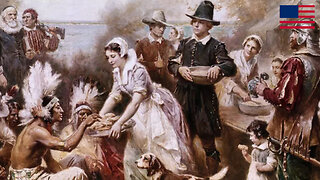Premium Only Content

Feeding the homeless people
Homeless poor people refer to individuals who lack a fixed, regular, and adequate nighttime residence and are also experiencing financial poverty. They face significant challenges in meeting their basic needs for shelter, food, clothing, and healthcare. Homelessness and poverty often intersect, as economic instability can contribute to housing instability, leading to homelessness.
These individuals may live on the streets, in temporary shelters, vehicles, or other inadequate and unsafe conditions. They often lack access to stable housing, social support systems, and essential services. Homeless poor people may include a diverse range of individuals, such as families with children, single adults, veterans, individuals with mental health issues, substance abusers, and those who have experienced job loss, eviction, or other unfortunate circumstances.
The experience of homelessness can be deeply distressing and disruptive to a person's life. It not only affects their physical well-being but also takes a toll on their mental and emotional health. Homeless poor people often face stigmatization and social exclusion, making it harder for them to break free from the cycle of poverty and homelessness.
Efforts to address the challenges faced by homeless poor people involve a combination of providing emergency shelters, transitional housing, and permanent supportive housing. Social welfare programs, such as income assistance, healthcare services, and job training, can play a crucial role in helping individuals transition out of homelessness and poverty.
It is important to recognize that homeless poor people are not defined solely by their circumstances. They are individuals with unique stories, strengths, and aspirations. Empathy, understanding, and supportive policies can contribute to creating a more inclusive and compassionate society that aims to alleviate homelessness and poverty.
-
 19:49
19:49
This Bahamian Gyal
13 hours agoFIRED after VENTING online about ELECTION results
2047 -
 LIVE
LIVE
REVRNDX
3 hours agoYOUR NEW FAVORITE RUMBLE STREAMER
102 watching -
 1:04:41
1:04:41
Russell Brand
2 hours agoIs This the End? Climate Emergencies, Kamala’s Chaos & Political Meltdowns EXPOSED! – SF502
73.4K140 -
 LIVE
LIVE
The Charlie Kirk Show
2 hours agoThe Harris Team's Comical Post-Mortem + Trump the Peacemaker + AMA | Paxton, Greenwald | 11.27.24
6,567 watching -
 1:21:15
1:21:15
RaikenNight
2 hours ago $1.59 earnedWanted to take the time to welcome all the new people coming over to Rumble
5.66K1 -
 15:12
15:12
Goose Pimples
5 hours ago7 Ghost Videos SO SCARY Your Phone Will Call 911 Itself
7781 -
![Almost Turkey Day! Ranked Heihachi into Blue Ranks? Nani?!?[Tekken 8] #RumbleTakeOver](https://1a-1791.com/video/s8/1/5/t/u/_/5tu_u.0kob-small-Almost-Turkey-Day-Ranked-He.jpg) LIVE
LIVE
CHiLi XDD
4 hours agoAlmost Turkey Day! Ranked Heihachi into Blue Ranks? Nani?!?[Tekken 8] #RumbleTakeOver
287 watching -
 59:24
59:24
The Dan Bongino Show
5 hours agoCoping Hollywood Actress Says Trump Supporters Are "Uneducated" (Ep. 2379) - 11/27/2024
562K1.73K -
 1:58:57
1:58:57
Benny Johnson
3 hours agoKamala Campaign EXPOSED as Scam To DEFRAUD Democrats | Spiraling Drunk Kamala Posts Slurring RANT 🤣
72.3K99 -
 6:49
6:49
Colion Noir
3 hours agoFood Vendor With Concealed Handgun License Shoots Robber Dead in Chicago
13.5K13